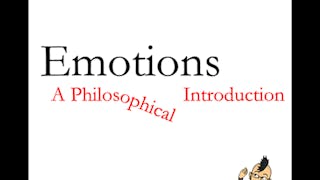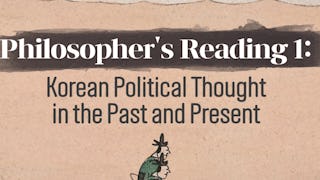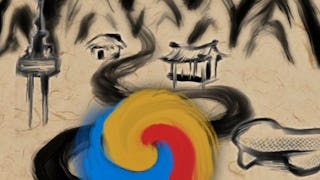This lecture series aims to explore our emotional landscape through the lens of the renowned Korean Confucian scholar, Seongho Yi Ik(星湖 李瀷, 1683- 1761) who lived through Joseon Dynasty, Korea. The Confucian project can be summarized as “Learning to be Human,” which involves not just biological development but also cultural and moral cultivation. Seongho emphasized the importance of emotional education as a crucial aspect of the Confucian cultivation program. Emotions play a significant role in understanding others and being understood, making them essential for navigating complex relationships and engaging with the world meaningfully. This series will delve into Seongho’s short yet profoundly insightful work on emotions, the New Compilation of the Four-Seven Debate (Sachil sinpyeon). His approach challenges us to think critically about our own emotional lives, how our emotions guide our moral choices, shape our relationships, and ultimately define who we become. By engaging with these lectures with curiosity and reflection, Seongho’s insights will not only enrich your understanding of Confucian moral psychology but also offer practical wisdom for leading a better life.


您将学到什么
Understand the importance of emotional education in the Confucian cultivation program through the philosophy of Seongho Yi Ik.
Understand the impact of emotions on moral actions and human relationships.
Explore the complexities of human emotions through Seongho’s work, the New Compilation of the Four-Seven Debate (Sachil sinpyeon).
Apply Seongho’s philosophical approach to daily life to gain practical wisdom for leading a better life.
您将获得的技能
要了解的详细信息

添加到您的领英档案
July 2025
9 项作业
了解顶级公司的员工如何掌握热门技能

该课程共有8个模块
This week, we’re going to learn about Seongho Yi Ik’s early life and how his childhood experiences shaped his later thinking. We’ll also look at his contributions to Neo-Confucianism and Practical Learning, as well as the historical background of the Four-Seven Debate.
涵盖的内容
7个视频2篇阅读材料1个作业1个讨论话题
This week, we’re going to look at Zhu Xi’s theories of moral psychology, especially how he understood human nature, emotions, and the heartmind. We’ll also be exploring how these ideas help explain moral motivation and the cultivation of ethical behavior.
涵盖的内容
6个视频1篇阅读材料1个作业1个讨论话题
This week, we’re going to look at how Seongho Yi Ik reinterpreted Zhu Xi's theory of emotions by grounding it in everyday life and personal practice. We’ll also explore his unique view of emotions, especially how everyday emotions can grow into moral emotions through reflection and social resonance.
涵盖的内容
6个视频1篇阅读材料1个作业1个讨论话题
This week, we’re going to look at Seongho Yi Ik’s perspectives on human emotions and how they relate to Confucian self-cultivation. We’ll also examine how the Four Beginnings and the Seven Emotions work together in his framework to guide moral life.
涵盖的内容
6个视频1篇阅读材料1个作业1个讨论话题
This week, we’re going to look at Seongho Yi Ik’s perspectives on compassion and commiseration and how they shape Confucian moral cultivation. We’ll also explore his “Dongche” model and how it connects emotions like compassion and grief to moral action and community.
涵盖的内容
6个视频1篇阅读材料1个作业1个讨论话题
This week, we’re going to look at Seongho Yi Ik’s perspectives on shame and disdain, and how they function in Confucian moral cultivation. We’ll also explore his “Mua” model and how these emotions help maintain moral integrity and a sense of righteousness.
涵盖的内容
6个视频1篇阅读材料1个作业1个讨论话题
This week, we’re going to explore Seongho Yi Ik’s views on the Fourth Beginnings, especially shi-fei (affirming/denying), and their place in Confucian emotion theory. We’ll also consider Seongho’s interpretation of affirming/denying and its role in moral psychology. Lastly, we’ll think about how wisdom works in his framework as a meta-cognitive process that completes and stores moral experiences.
涵盖的内容
6个视频1篇阅读材料1个作业1个讨论话题
This week, we’re going to examine Seongho Yi Ik’s perspectives on the Four Beginnings and how they contribute to Confucian moral cultivation. We’ll explore the differences between the Four Beginnings and the Seven Emotions, especially in terms of their public (gong) and private (sa) characteristics. We’ll also look at Seongho’s argument that the Four Beginnings guide and control the Seven Emotions to prevent harmful or immoral behavior.
涵盖的内容
7个视频1篇阅读材料2个作业1个讨论话题
位教师



从 Philosophy 浏览更多内容
 状态:预览
状态:预览Universitat Autònoma de Barcelona
 状态:预览
状态:预览Sungkyunkwan University
 状态:免费试用
状态:免费试用Sungkyunkwan University
 状态:免费试用
状态:免费试用University of Cambridge
人们为什么选择 Coursera 来帮助自己实现职业发展




常见问题
To access the course materials, assignments and to earn a Certificate, you will need to purchase the Certificate experience when you enroll in a course. You can try a Free Trial instead, or apply for Financial Aid. The course may offer 'Full Course, No Certificate' instead. This option lets you see all course materials, submit required assessments, and get a final grade. This also means that you will not be able to purchase a Certificate experience.
When you purchase a Certificate you get access to all course materials, including graded assignments. Upon completing the course, your electronic Certificate will be added to your Accomplishments page - from there, you can print your Certificate or add it to your LinkedIn profile.
Yes. In select learning programs, you can apply for financial aid or a scholarship if you can’t afford the enrollment fee. If fin aid or scholarship is available for your learning program selection, you’ll find a link to apply on the description page.
更多问题
提供助学金,






